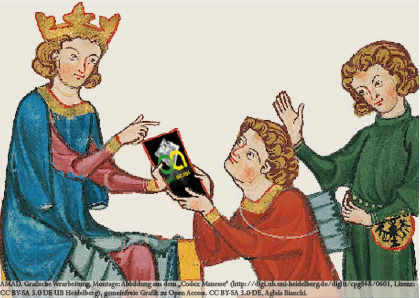AMAD
„Archivum Medii Aevi Digitale - Interdisziplinäres Open-Access-Fachrepositorium und Wissenschaftsblog für Mittelalterforschung‟Zur Einreichung

| Datum: | 2010 |
| Titel: | ‘Fashioning Renaissance Literary Femininity’. Percorsi della memoria. Percorsi dall’oblio alla canonizzazione |
| Autor*in: | LOCATELLI PREDA, MARICA |
| Beschreibung: | My paradigms in this respect were Lady Anne Clifford and Alice Anne Thornton. They produced texts that have not even been mentioned or considered for centuries, but that have recently been partially rediscovered and appreciated by critics. My intent was to show how cultural factors and ideologies of the time influenced literary production, and to analyse the reasons that led these authors and their texts, first to oblivion, and later to recovery and canonization. When attempting to give a coherent answer to these questions, I kept in mind the background of Renaissance cultural memory and ideology, with particular regard to notions of femininity. Women writers are “mothers of the text”, creators of new horizons, expert connoisseurs of the ideologies of their time, but also lonely, isolated, subjected women, ready to record their memories in voices that try to rise above a thousand other voices. ; The reasons that led women to overcome the injunction against cultural expression, including autobiography are one of the most relevant topics of my thesis. We know that many female characters were marginalized, if not made virtually invisible in many cultures and ideologies. That’s why I tried to unveil the “counter” itinerary of women's writing from oblivion to canonization. ; English writers then began to deal with secular autobiography in the seventeenth century. Though excluded from the political scene and from public social life, Early-modern women writers seemed to be able to add something new and significant to the memorials and autobiographies of their own contemporary authors. When a woman wanted to be considered a member of a community whose experience was worthy of memory, she was confined by her own culture and family situation in the role of daughter, wife and mother, and she was seen almost exclusively as the subject of stories of religious experience, visions, trances, ecstasies. However, in the late seventeenth century, autobiography began to depart from an exclusively religious background and from the narrative account of the lives of men, and women began not only to record events related to male lives, but also to explore their identity and their own experiences in autobiographical form. Autobiography acquired the modern meaning of personal, introspective, secular writing, and, suddenly, the texts written by daughters, mothers and wives began to be recognized as real contributions to a genre in constant evolution. ; This doctoral thesis deals with the problem of canonisation and/or exclusion of women’s writings from the literary canon of the English Renaissance. More broadly, it deals with issues of memory and cultural transmission. The first part of the thesis focuses on memory in different disciplines and on studies of memory in the contemporary critical arena. I tried to give an overview of the most recent progress in this field of study. The following chapters deal with issues of oblivion and recognition (up to the canonisation) of English women’s writers in the Renaissance. |
| URI: | https://www.amad.org/jspui/handle/123456789/82279 |
| Quelle: | http://hdl.handle.net/10446/597 |
| AMAD ID: | 693393 |
| Enthalten in den Sammlungen: | BASE (Bielefeld Academic Search Engine) General history of Europe |

